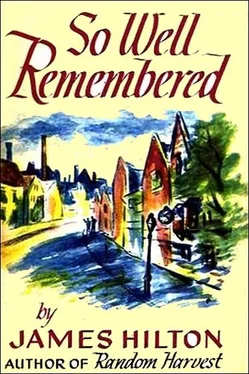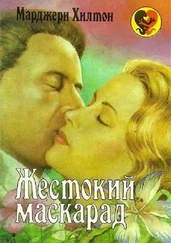Джеймс Хилтон - So Well Remembered
Здесь есть возможность читать онлайн «Джеймс Хилтон - So Well Remembered» весь текст электронной книги совершенно бесплатно (целиком полную версию без сокращений). В некоторых случаях можно слушать аудио, скачать через торрент в формате fb2 и присутствует краткое содержание. Год выпуска: 1945, Жанр: Проза, на английском языке. Описание произведения, (предисловие) а так же отзывы посетителей доступны на портале библиотеки ЛибКат.
- Название:So Well Remembered
- Автор:
- Жанр:
- Год:1945
- ISBN:нет данных
- Рейтинг книги:5 / 5. Голосов: 1
-
Избранное:Добавить в избранное
- Отзывы:
-
Ваша оценка:
- 100
- 1
- 2
- 3
- 4
- 5
So Well Remembered: краткое содержание, описание и аннотация
Предлагаем к чтению аннотацию, описание, краткое содержание или предисловие (зависит от того, что написал сам автор книги «So Well Remembered»). Если вы не нашли необходимую информацию о книге — напишите в комментариях, мы постараемся отыскать её.
So Well Remembered — читать онлайн бесплатно полную книгу (весь текст) целиком
Ниже представлен текст книги, разбитый по страницам. Система сохранения места последней прочитанной страницы, позволяет с удобством читать онлайн бесплатно книгу «So Well Remembered», без необходимости каждый раз заново искать на чём Вы остановились. Поставьте закладку, и сможете в любой момент перейти на страницу, на которой закончили чтение.
Интервал:
Закладка:
“Aye… because somebody threw some apple-pie in my face during an election. The pie stuck but the name didn’t.” He laughed and Winslow laughed, and it was as if one of several barriers between them was from then on let down. “Too bad I haven’t that drop of whisky for you,” George continued. “But how about changing your mind about another cup of tea?”
“Thanks, I will.”
George went to the door and shouted down the corridor to Annie, then came back and began to search a time-table on his desk. “If we’re both going to start in the morning, maybe you’d like to spend the night here?”
“That’s very kind, but I think I’d better go back to London as I planned and join you there tomorrow.”
“Just as you like. There’s a good train at five-eighteen—that still gives you an hour, so take it easy.”
Winslow seemed now better able to do this, and until the time of leaving they both relaxed, arranged further details of their meeting the next day, and talked quite casually on a variety of subjects—some even verging on the intellectual, though George was not in the best mood for appreciation.
Then he took Winslow to the train, and only in the final minutes before its departure did they refer to the personal matter again. Winslow muttered, leaning out of a first-class compartment: “I—I must say it, Boswell —I—I really don’t know how to thank you for—for taking all this in the way you have…”
“What other way was there to take it?”
“I know, I know… but it’s such an extraordinary situation for you to have been able to come to terms with.”
“Who says I’ve come to terms with it?”
“Yes, but I mean—when I try to imagine myself in your place—”
“DON’T.” And there was just the ghost of a smile on George’s face to soften the harsh finality of the word.
“All right… but I can’t help feeling more hopeful already—thanks to you. Of course the affair’s still incomprehensible to me in many ways —for instance, to fathom the kind of person who could do such a thing… of course you know her, but then I know Jeff, and he’s not a fool —that’s what makes HIS side of it so hard to understand.”
“Oh, maybe not so hard,” George replied. “It’s probably what you said that you couldn’t find a name for.”
“Infatuation?”
“If you like.” And then, abruptly and without caring for the awkwardness of time and place, George began to tell something about Livia that he had never mentioned to anyone before. Perhaps it was the atmosphere of a railway station that reminded him, for it had happened (he said) at the end of their honeymoon when they were to catch a night train from a seaside place back to London. They had spent the last day pottering about the promenade between showers, and during one of these, while sheltering, they had got into conversation with a well-dressed and rather distinguished-looking man of sixty or so. It was one of those chance acquaintanceships that flourish amazingly without either background or future prospects; almost immediately the stranger offered to conduct them through an adjacent art gallery which, though full of very bad canvases, gave him the chance to talk so fascinatingly about paintings that they thought he must belong to that world himself until later he talked with equal fascination about literature, music, and politics. Within an hour they were all chattering together like old friends, and as evening approached it seemed perfectly natural to accept the stranger’s invitation to dine. (He had given them his name and told them he was French, which had further amazed George because of his completely accentless English.) The two newly-weds were presently entertained in a manner to which they were wholly unaccustomed and which they could certainly not have afforded—George smilingly declined to break his temperance pledge, but ate two dozen oysters with gusto while Livia drank champagne and laughed a great deal. After dinner it seemed equally natural that the stranger should drive them back to their hotel in his car and later take them on to the railway station. The train was already drawn up at the platform, so the three of them sat together in an otherwise unoccupied compartment with half an hour to wait. Suddenly George discovered the hotel-room key in his pocket and, excusing himself, walked down the platform to the station office to arrange for its return. He wasn’t away more than ten minutes, and when he got back the three resumed their conversation until the train’s departure.
About a year later (George went on), Livia exclaimed suddenly, during a rather trivial quarrel: “That Frenchman sized you up all right—HE said I oughtn’t ever to have married you!” More startled than angry, George then asked for an explanation. She wouldn’t give any at first, but on being pressed said that during the few minutes he had left her alone in the train with the stranger, the latter had made her an ardent profession of love and had actually implored her to run off with him.
When George reached this point in the story he commented rather na vely: “I suppose that COULD happen, with a Frenchman, even though he’d only set eyes on her a few hours before.”
“Perhaps in that particular way he was unbalanced.”
“No—or at least there wasn’t much other evidence of it. You see, having once got interested in the man, I’d found out a few things about him and followed his career. He’d been married and raised a family long before his meeting with us, and recently he’s become fairly well known as one of the financial experts to the Peace Conference. You’d recognize the name if I told you, but I don’t think that would be quite fair because a few months ago he and his wife came to London on some official mission, and there were photographs of them in the papers looking as if they’d both had a lifetime of happiness.”
“Maybe they had.”
A sudden commotion of door-banging and engine-whistling drowned George’s reply and caused him to repeat, more loudly: “I shouldn’t wonder.”
“There’s one other thing that occurs to me, Boswell, if you’ll forgive my mentioning it—”
“Of course.”
“HOW DO YOU KNOW THE INCIDENT REALLY HAPPENED?”
The train began to move and George walked with it for a few seconds, hastily pondering before he answered: “Aye… I can see what you mean… Funny—I hadn’t ever thought of THAT. And yet I should have, I know.” His walk accelerated to a scamper; there was now only time to wave and call out: “Goodbye… see you tomorrow… Goodbye…”
When the train had left he stood for a moment as if watching it out of sight, but actually watching nothing, seeing nothing. A porter wheeling a truck along the platform halted and half turned. “‘Night, George.”
“Good night,” responded George mechanically, then pulled himself together and walked down the ramp to the station yard.
He felt he must at all costs avoid the main streets where people would stop him with congratulations on the success of the day’s events. There was a footpath skirting the edge of the town that meant an extra half-mile but led unobtrusively towards the far end of Market Street. Nobody went this way at night except lovers seeking darkness, and darkness alone obscured the ugliness of the scene—a cindery waste land between town and countryside and possessing the amenities of neither; it had long been a dream of his to beautify the whole area with shrubs and lawns, to provide the youth of Browdley with a more fitting background for its romance. But Browdley youth seemed not to care, while those in Browdley who were no longer youthful objected to the cost. Perhaps for the first time in his adult life George now traversed the waste land without reflecting ruefully upon its continued existence; he had far more exacting thoughts to assemble, and in truth he hardly knew where he was. The day that had begun so well was ending in trouble whose magnitude he had only just begun to explore, and with every further step came the deepening of a pain that touched him physically as well as in every other way, so that he felt sick and ill as he stumbled along. He was appalled by the realization that Livia still had such power to hurt him.
Читать дальшеИнтервал:
Закладка:
Похожие книги на «So Well Remembered»
Представляем Вашему вниманию похожие книги на «So Well Remembered» списком для выбора. Мы отобрали схожую по названию и смыслу литературу в надежде предоставить читателям больше вариантов отыскать новые, интересные, ещё непрочитанные произведения.
Обсуждение, отзывы о книге «So Well Remembered» и просто собственные мнения читателей. Оставьте ваши комментарии, напишите, что Вы думаете о произведении, его смысле или главных героях. Укажите что конкретно понравилось, а что нет, и почему Вы так считаете.










